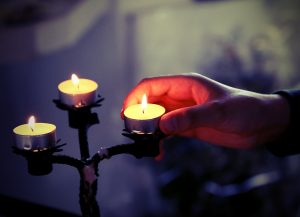Notice During the Covid-19 Outbreak
In solidarity, we at the Interfaith Peace Project stand together in these times of heart break and upset. Some of you may have lost friends or family members. Some of you may have lost your job and your income; some may be working overtime to help with the crisis. Some of you may be home and alone and some may be trying to figure out a new way to live. Please let us know how we can help. If you would like a phone appointment with any of us, give us a call.You may call or email Tom at:
November 7, 2020
 © ChiccoDodiFC stock.adobe.com
© ChiccoDodiFC stock.adobe.comAWAKE
A Reflection from the Christian Traditions
Matthew 25: 1-13
by Thomas P. Bonacci, C.P.
Matthew 25: 1-13
by Thomas P. Bonacci, C.P.
When the disciples of the Buddha asked him how he would like to be remembered, he famously answered, “As one who is awake.” The Gospel for the thirty-second Sunday in Ordinary Time is about vigilance (see Matthew 25: 1-13). Vigilance invites us to be “awake,” so we might see what is going on around us and what is happening within us. It is more than introspection leading to regret or remorse. One who is awake discerns the potential virtues in the deep recesses of their heart, mind, and soul. They must act upon this potential, activating it in a compassionate way of living. The “oil” in the lamp of the heart is no less than God’s love poured full strength into our very nature as human persons. As Genesis so potently proclaims, “God fashioned them in the image and likeness of God” (see Genesis 1:27).
The same can be said for a people as a whole or a Nation in particular. In times of crisis, people discover what truly makes them great. They become alert, awake, and sensitive to the World around them. It usually has something to do with rediscovering the human capacity for compassion, respect, and responsibility in relation to the well-being of the World. We live on Earth as members of a family of Nations and peoples. One who is awake is also responsible and caring. Jesus called this reality the “Kingdom of God.” The Kingdom comes in varied ways. We often perceive the Kingdom of God as no more than a mustard seed (Matthew 13: 31-32) or a peasant woman baking bread (Matthew 13: 33) or little children (Matthew 19: 14). The “one who is awake” will perceive and welcome the arrival of the Kingdom of God in the so-called ordinary and typical moments of life.
Jesus also spoke of the Kingdom of God as dwelling within the heart of each and every person. One who is awake perceives and experiences the Kingdom deep in their being. “Kingdom” means providence, guidance, direction, and deepest conviction. The Kingdom of God is realized in the faithful vigilance of anyone who is awake to what is happening around them.
The Parable of the Wise and Foolish Virgins is a difficult one. Our first impulse is to wonder why the wise did not share their oil with the foolish. On the surface, the wise ones seem less than generous if not self-righteous. What are we to make of this situation?
Parables, like all powerful and pithy stories, can move in alarming and surprising directions. Our parable concerns the vigilance necessary to be an authentic disciple of Jesus. The parable emphasizes the necessity to be vigilant, awake, and ready to meet the Master who might show up at unexpected times and in unlikely people.
The parable warns us against the bad habit of sitting around, waiting for something to happen. It is time to oil our lamps, trim the wicks, and see by the light what needs to be done and who needs to be loved in the here and now of life.
Thank you, Holy Community, for being awake, vigilant, and caring. The One we are waiting for with great expectation has shown up in you.


Off